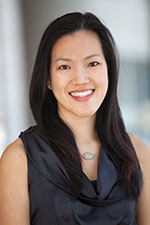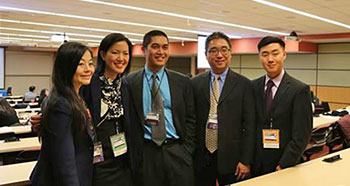

Health and Diversity
Fostering Education and Difficult Conversations
As the child of immigrants from China and Vietnam, second-year medical student Nancy Dong learned about cultural diversity at an early age. Born and raised in Sarasota, Florida, she also became immersed in science and medicine quite young by helping her parents translate what their doctors said during medical appointments.

Nancy Dong“We spoke Cantonese at home, and neither of my parents was comfortably fluent in English,” she explained. “Starting in middle school, whenever they had an appointment, I would go along to help with any paperwork and with translating how to use their medications. It made me realize how important science is, but also that medicine is how science actually gets applied to help others.”
The experience sparked her interest in pursuing medicine as a career.
Assuming a Leadership Role
Fast-forward a decade and you’ll find Ms. Dong in her second year as regional co-director of the Asian-Pacific American Medical Student Association (APAMSA) for New York and New Jersey. She and other area regional directors recently hosted APAMSA’s annual regional conference, “The Missing Pieces in Asian Pacific Islander American Healthcare,” held during February at the Icahn School of Medicine at Mount Sinai. The group followed on their successful regional conference last year, again seeking to focus on issues and factors that affect Asian-American patients and professionals.
“Because we had a long day of events planned, we defined the goals for the day and how the structure of the conference would help us achieve those goals,” she explained. “We stressed the importance of each presentation and how they were inter-related, and I believe that these small details helped make our event more successful and attendee-centered.”
She added, “Working in a team successfully is a constant exercise in learning about who you are working with and self-reflecting on how you interact or lead,” she said.
This past January, Ms. Dong reflected further on these lessons when she and classmate Davis Uzochukwu Anugo discussed the concept of including leadership training as part of the curriculum for medical students, particularly concerning effective teamwork and communication.
Building on Past Experience

Nancy Dong (second from left) at the APAMSA conference with other members of a mental health panel, which led a discussion on "What Physicians Should Know About Asian American Mental Health.”Ms. Dong’s involvement with APAMSA and building effective communications are a natural extension of her activities as an undergraduate at Williams College, in Massachusetts, where she took part in an Asian-American interest group and also served on a writing committee that was part of a larger group whose members came together to address a racial incident that had occurred on campus.
“The spring of freshman year, someone scrawled a racist slur on another student’s door,” said Ms. Dong. “It was a tipping point on a campus that wasn’t very culturally diverse, and it sparked a conversation among students and faculty. I felt drawn to be part of the discussion and to help address it.”
She joined two other students in drafting a proposal to institute an annual day on the college campus called “Claiming Williams,” aimed at fostering a more racially and culturally aware community. The proposal was accepted, and Claiming Williams Day was established. On the first Thursday of the spring semester, classes were replaced with invited speakers, events focused on cultural diversity, and small group discussions to encourage difficult conversations.
She noted, “I think it’s important to create exposure to issues that people might not see are there. I also think it can be helpful to foster discussions across diverse groups of people. It’s how we can gain greater understanding of unique qualities in individuals as well as the common factors that bond us as humans.”
Eight years later, the tradition of Claiming Williams continues.
A Detour to Teaching
Ms. Dong pursued a double major in chemistry and in Chinese at Williams, and completed pre-med requirements. Although coursework left her little down time, she also managed to spend her junior year in a study-abroad program that took her to four countries—Switzerland, India, China and South Africa.
“I conducted a comparative study of cardiovascular health across the four countries, each of which had a different healthcare system,” she said. “I came away fascinated by the role of education in public health outcomes.”
She continued, “In each country, we mapped environmental factors important for public health, and we found that many of them looped back to education. I saw how education affects a family’s financial status and their access to health.”
The impact of observing the role that education can have for communities led her to pursue a job in teaching after college. She applied to Teach for America (TFA) and was assigned to teach high school chemistry in Los Angeles.
“I’ve always been drawn to how science is applied to the human body, so I engaged my students in science by relating it back to their bodies,” she recalled. “For example, when we studied acid and base chemistry in the stomach, they learned about thermodynamics by studying the calories in Cheetos.”
She continued to teach for a year after her assignment with TFA ended but knew her true passion was working with others through medicine. She applied to medical schools and chose Einstein because of its emphasis on serving under-resourced communities.
“The communities we serve through our education at Einstein are a lot like the community where I taught in L.A.,” she said. “And I believe you begin to help improve people’s health through educating them.”
When she arrived on campus, her involvement with Williams’ Asian-American interest group sparked her interest in Einstein’s APAMSA chapter. She attended the organization’s national conference and was elected an APAMSA regional director for NY and NJ.
She also has taken part in White Coats for Black Lives events that have been held on campus. “It’s important to hear others out and talk about issues without trivializing them,” she said. “We don’t all have to agree, but we should at least be willing to listen.”
Pausing a moment in thought, she added, “I believe that there’s still more to learn, about each other and about ourselves. To be able to do this requires skills in communication and emotional intelligence, which are also necessary for us to be successful physicians as colleagues, healers and leaders.”
Posted on: Monday, March 21, 2016


